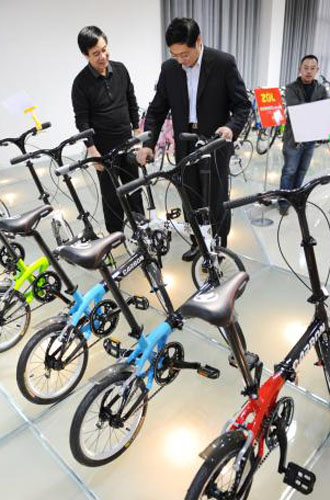Excessive protection of the bicycle industry weakens EU's competitiveness
"The Chinese Government is subsidizing its bike producers." If you made such a statement to passers-by in Beijing, you might be considered insane. Bicycle producers are neither high-tech enterprises nor a pillar of the local economy.
|
 Customers try carbon fiber bicycles, the country's first model of its kind with independent intellectual property rights, in Lianyungang, Jiangsu province. [Photo/CFP] |
No government at any level would throw money at an industry ordinary people care very little about. Furthermore, bike production does not need a large investment or special fiscal support. Bike production has been a market-oriented industry in China, so it is strange to suggest the industry is subsidized.
The European Union, however, holds such a view. Its trade protectionism measures against Chinese bikes - for reasons of dumping and government subsidies - have lasted 20 years.
In 2011, Chinese bikes exported to the EU accounted for a mere 3 percent of total bike sales in that market, with no dumping or other damage brought to the European bike-producing industry. The United States and Japan have both opened their markets to Chinese bikes, leaving the EU as the only developed economy behaving as an outlier.
"China used to be a big bike producer. Twenty years ago the EU protected its enterprises by blocking Chinese bikes from entering its market," said Liu Pengxu, deputy director of the Legal Service Department of China Chamber of Commerce for Import and Export of Machinery and Electronic Products, or CCCME.
"The EU's anti-dumping measure has continued 20 years on. Any industry after such lengthy protection can solve its problems and grow into a healthy and strong industry. Therefore, the EU shouldn't carry out such measures against WTO rules," Liu said.
The Longest punitive tariff
The EU has imposed anti-dumping tariffs against Chinese bikes even after several sunset reviews. During the latest sunset review carried out in October 2011, the EU decided to extend the then-19-year-old tariff by five years to 2016, with the anti-dumping tariff rate standing at 48.5 percent.
The European Commission announced in April that it will begin an anti-subsidy investigation against Chinese bikes. On Sept 25, it said that it would launch an anti-circumvention investigation into imports of bicycles originating in China and shipped through Indonesia, Malaysia, Sri Lanka and Tunisia.
The EU argues that evidence proves the anti-dumping measures on imports of bicycles originating in China are being circumvented by means of shipment via the above-mentioned countries. According to EU figures, in 2009-10, EU's imports of bicycles from Sri Lanka doubled, accounting for 5 percent of the market share.
The EU suspects Chinese bike makers are evading anti-dumping tariffs. Authorities will decide within nine months whether to raise anti-dumping tariffs. Once any decision is made, the involved products in the above regions will be subject to anti-dumping tariffs.
The EU has already adopted a number of trade remedy measures, including anti-dumping, anti-subsidy and anti-circumvention measures, with only safeguard measures left unused. Safeguard measures are defined as an "emergency" action in which a particular import threatens to cause serious damage to the local industry.
After nearly 20 years of anti-dumping measures, it would be difficult for bicycles imported from China to Europe to proliferate in a short time.
Tu Xinquan, deputy director of the China Institute for WTO Studies at the University of International Business and Economics, said the reason the EU has imposed anti-dumping tariffs against Chinese bikes is due to the strong competitiveness of the Chinese products. The EU is concerned about the impact on its industry should anti-dumping tariffs be suspended, and therefore has turned to protectionism to shield itself.
